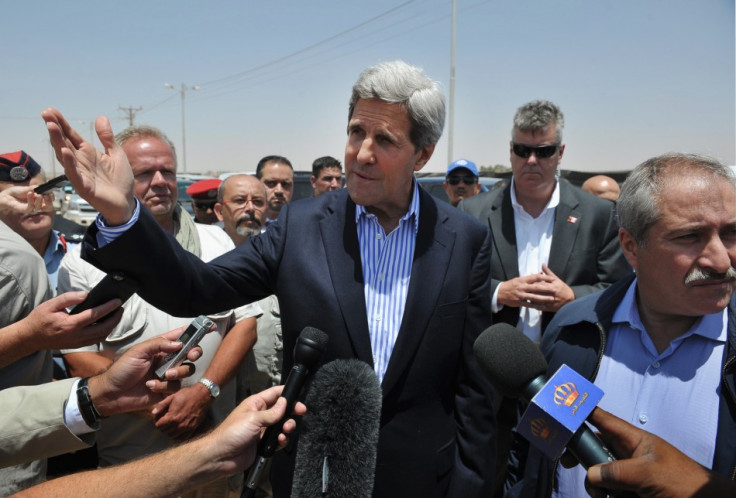Israeli Breakthrough Concession on Cards to Ease Palestinian Peace Talks?
1967 ceasefire line agreement believed to be at centre of peace deal offer by US Secretary of State John Kerry

US Secretary of State John Kerry was in the West Bank for his sixth peace-making visit to the region since March amid rumours that he was touting a ground-breaking peace formula to the Palestinians.
Kerry was set to meet Palestinian president Mahmoud Abbas after presenting his plan to chief negotiator Saeb Erakat. According to sources for Reuters, the proposals might include a breakthrough Israeli concession: agreeing to peace talks based on pre-1967 borders and land swaps.
Tel Aviv has always battled the decades-old UN resolution calling on it to release territories it gained during the Six-Day War in 1967: the West Bank, the Gaza Strip and East Jerusalem. It withdrew from Gaza in 2005.
Mark Regev, spokesman for Israeli prime minister Benjamin Netanyahu, rejected the Reuters story.
"All eyes are on what the Palestinians decide," was all he would say.
At a meeting on Thursday, Palestinians reportedly demanded a guarantee that negotiations on borders between a Palestinian state and Israel would be based on the ceasefire line from 1949-67. President Barack Obama asked Israeli Prime Minister Benjamin Netanyahu to work with Kerry "to resume negotiations with Palestinians as soon as possible," according to a White House statement.
Major issues that Kerry will face in order to revive peace talks are the status of Jerusalem (Israel regards it as its capital while the Palestinians regard East Jerusalem as the capital of a Palestinian state), Jewish settlements in the West Bank, Israeli security against Palestinian rockets and the status of Palestinians.
External diktats
Tel Aviv has meanwhile reacted strongly to new EU guidelines prohibiting grants, funding, prizes or scholarship to Israel unless it explicitly excludes Jewish colonies in the West Bank or East Jerusalem in any references. The move, called an "earthquake" by Israeli official, caused furious criticism from the Netanyahu over "external diktats".
"As prime minister of Israel, I will not allow the hundreds of thousands of Israelis who live in the West Bank, Golan Heights and our united capital Jerusalem to be harmed. We will not accept any external diktats about our borders. This matter will only be settled in direct negotiations between the parties," Netanyahu said.
The directive, part of the 2014-20 financial frameworks and covers all areas of cooperation between the EU and Israel requires that Israel concedes in writing that settlements in the West Bank and East Jerusalem are outside the state of Israel.
The guidelines "set out the territorial limitations under which the commission will award EU support to Israeli entities", said the EU.
"Concern has been expressed in Europe that Israeli entities in the occupied territories could benefit from EU support. The purpose of these guidelines is to make a distinction between the state of Israel and the occupied territories when it comes to EU support."
The directive followed a decision by EU foreign ministers in December that "all agreements between the state of Israel and the EU must unequivocally and explicitly indicate their inapplicability to the territories occupied by Israel in 1967".
All Israeli settlements are illegal under international law.
© Copyright IBTimes 2025. All rights reserved.






















